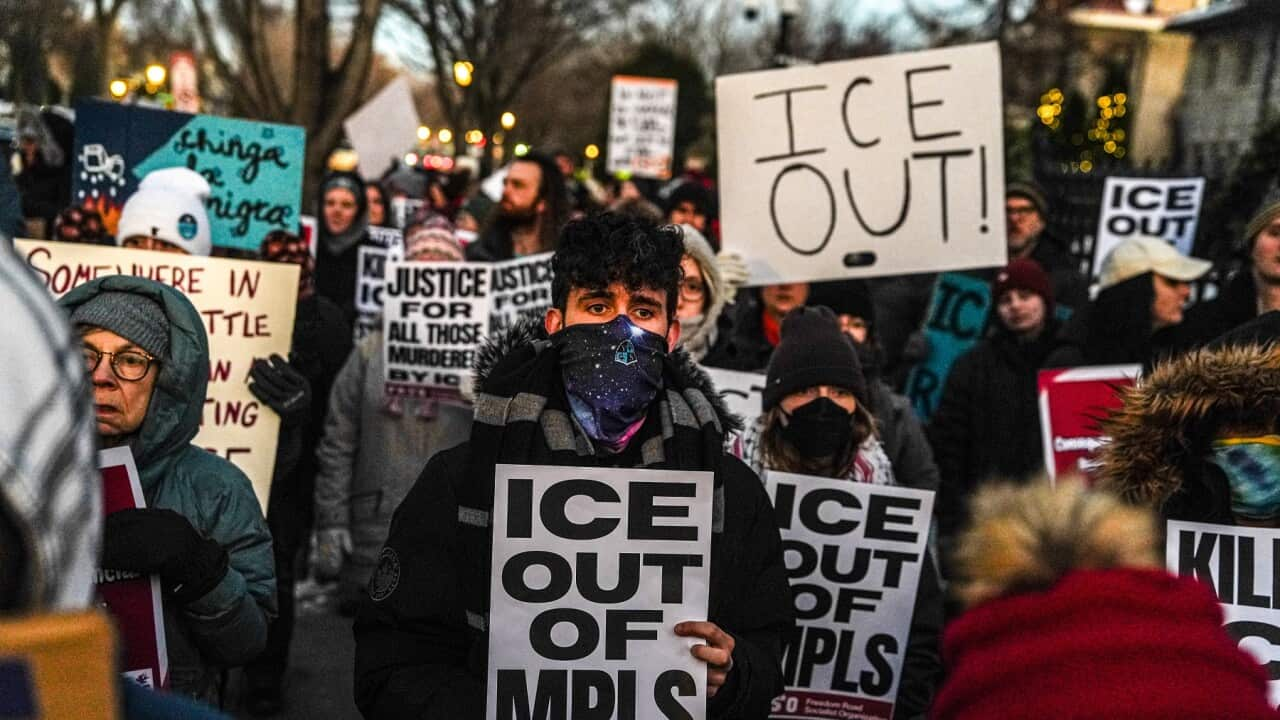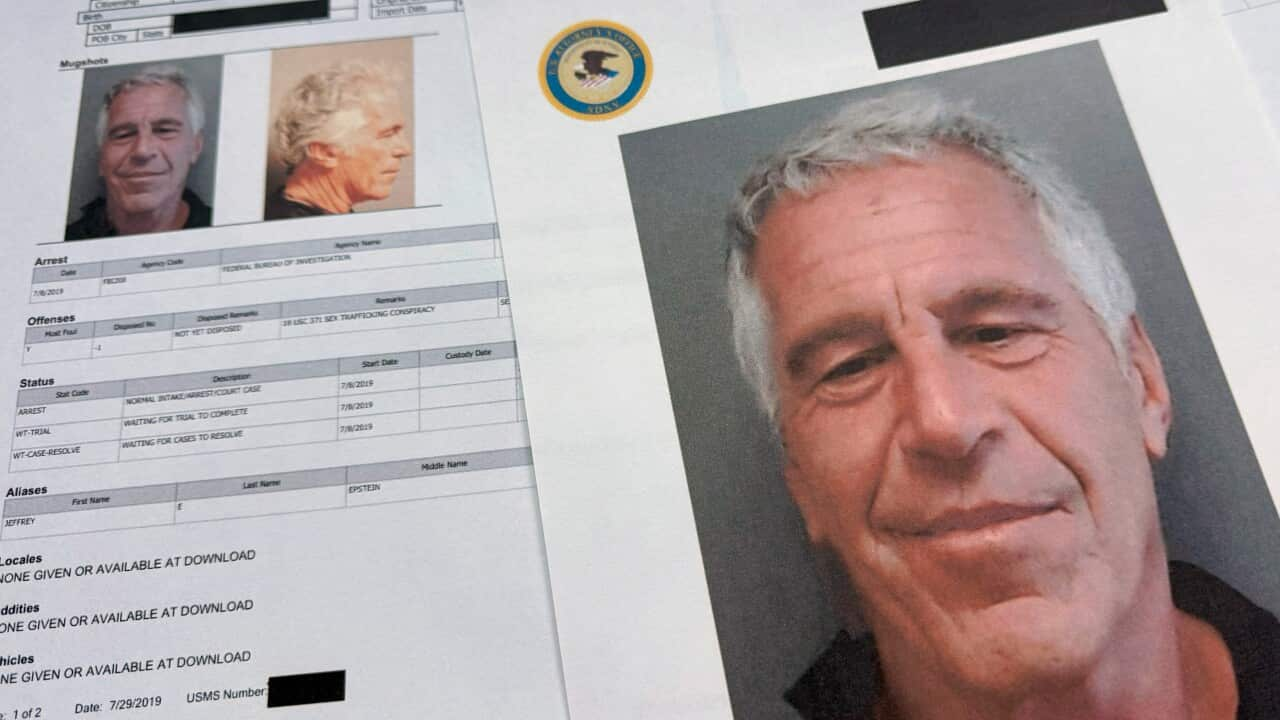Listen to Australian and world news, and follow trending topics with SBS News Podcasts.
TRANSCRIPT
US President Donald Trump is hopeful that a meeting between himself, Russia’s Vladimir Putin, and Ukraine’s leader, Volodymyr Zelenskyy will take place in the near future.
Speaking from the Oval Office, the US President made it clear that he sees himself as a key figure in bringing an end to the war.
"Well, there's a very good prospect that they will. And we haven't determined where, but we had some very good talks with (Russian) President (Vladimir) Putin today. And there's very good chance that we could be ending the, ending the round, ending the end to that road. That road was long and continues to be long. But there's good chance that there will be a meeting very soon."
But despite hopes of a summit, Mr Trump also noted that no breakthrough had yet occurred.
He says Russia has lost over 20,000 troops since January, and insisted that this war would never have started under his leadership.
"I mean, we've been working on this a long time. There are thousands of young people dying, mostly soldiers, but also, you know, missiles being hit into Kyiv and other places. But in terms of soldiers, I think Russia's lost over 20,000 since the beginning of the year. 20, 000. And I guess the estimate for Ukraine is about 9,000. It's a terrible situation. We want to get it stopped."
Still, questions remain about the format of any summit.
Would President Zelenskyy be at the table, or would Mr Trump meet his Russian counterpart alone?
Asked directly if he would proceed with a summit even if President Putin refuses to meet Ukraine’s president, Mr Trump was blunt.
“No, he doesn’t. No. No. They would like to meet with me, and I’ll do whatever I can to stop the killing.”
From Moscow, there’s optimism about potential economic opportunities arising from a thaw in US, Russia relations.
Kirill Dmitriev, the Kremlin’s envoy for international investment, says dialogue with Washington is bearing fruit.
"The summit between the Russian and US leaders that is planned, we hope, for next week, of course, can become an important historical event, an event when Russia's position will be clearly conveyed to President Trump. And we hope that this dialogue will continue even more actively, including in the economic direction. We see that joint investments, including with US investors, in projects in the Arctic, in rare earth metals, in infrastructure projects, can be mutually beneficial for both Russia and the United States. And we see that we can also develop joint investments in technology companies and many others.
He added that U-S firms have lost an estimated US$300 billion dollars by withdrawing from the Russian market.
But in Kyiv, many are uneasy.
President Zelenskyy insists Ukraine must be part of any negotiation.
"Everyone obviously knows for sure that the key decisions in Russia are made by one person (referring to Vladimir Putin). And that this person is afraid of sanctions from the United States of America. And that it is right for Ukraine to be a participant in the negotiations. Russia's war is against Ukraine, against our independence as the embodiment of the independence of every European nation.”
Mr Zelenskyy praised Mr Trump’s openness to finding real solutions but warned that any peace talks lacking Ukrainian representation would lack legitimacy.
"So the format of the meetings, the meeting of leaders is, in particular, a trilateral format. And we talked about this in detail yesterday - about several bilateral formats, about a trilateral format, about all the possibilities. I am grateful to (U.S.) President (Donald) Trump for his openness to finding real solutions. We in Ukraine are confident that this war can be ended with a lasting peace."
Meanwhile, US Secretary of State Marco Rubio struck a cautiously optimistic tone, saying talks are finally shedding light on Russia’s terms for ending the war.
"We have some concrete examples of the kinds of things that Russia would ask for in order to end the war. We haven't had much of that to this point. Obviously, the Ukrainians have a say in this. We got it, we got to bring the two sides and the two positions close enough so that, you know, the ultimate closer, President Trump, can get involved and make it happen.”
Secretary Rubio adds that progress is being made, but the parties still have a long road ahead.
Meanwhile, public opinion in Moscow appears to favour dialogue.
One local, Denis Derkach, says that talking is better than silence.
“The dialogue is much better than such a cold phase, when (former U.S. president Joe) Biden did not communicate with (Russian President Vladimir) Putin at all. If (U.S. President) Trump is willing to communicate, communication comes from the word common, so if some common values and indicators are found, on this basis we can of course talk about good things. We must always think about good things.”
But not everyone is convinced.
In Kyiv, residents expressed frustration and doubt. Volodymyr Tasak, a local man, was sceptical.
"Honestly, I don't care much, because two liars will get together and each will have his own mind. Therefore, it is unlikely that there will be anything sensible there and it's very regrettable that in reality our leader is being squeezed out in these negotiations. And this is not fair and (it's) wrong."
A potential summit between Presidents Putin and Trump, possibly in the UAE, would mark the first US - Russia summit since 2021.













